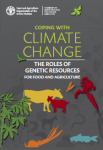Genetic resources have a critical role to play in feeding the world, especially as climate change advances, according to a book, 'Coping with Climate Change: The Roles of Genetic Resources for Food and Agriculture,' released by the Food and Agriculture Organization of the UN (FAO), led by its Commission on Genetic Resources for Food and Agriculture (CGRFA).
 19 January 2015: Genetic resources have a critical role to play in feeding the world, especially as climate change advances, according to a book titled ‘Coping with Climate Change: The Roles of Genetic Resources for Food and Agriculture.’ The book was released by the Food and Agriculture Organization of the UN (FAO), led by its Commission on Genetic Resources for Food and Agriculture (CGRFA).
19 January 2015: Genetic resources have a critical role to play in feeding the world, especially as climate change advances, according to a book titled ‘Coping with Climate Change: The Roles of Genetic Resources for Food and Agriculture.’ The book was released by the Food and Agriculture Organization of the UN (FAO), led by its Commission on Genetic Resources for Food and Agriculture (CGRFA).
Launched on the occasion of the fifteenth session of the CGRFA, the publication aims to raise awareness of the important roles of genetic resources for food and agriculture in coping with climate change and to contribute to the mainstreaming of genetic resources for food and agriculture into climate change adaptation and mitigation planning at national and international levels. Based on several thematic studies, it presents an overview of the complex interactions between climate change and plant, animal, forest, aquatic, invertebrate and micro-organism genetic resources.
The publication’s introductory section provides a brief overview of the main international processes relevant to climate change. Six sections then cover the various sectors of genetic resources. Each section addresses two key questions: what are the possible effects of climate change on genetic resources for food and agriculture and how does it influence their management; and what are the specific roles of genetic resources for food and agriculture in coping with climate change.
The book concludes that if agriculture is to adapt to climate change and achieve food security and nutrition goals in the coming decades, food production systems and the wider ecosystems on which they rely will have to become increasingly flexible, multifunctional and capable of providing multiple services. Responding to climate change will require focusing attention at the ecosystem level and ensuring coordinated policy responses both nationally and internationally. The application of the ecosystem approach, a strategy for the integrated management of land, water and living resources that promotes conservation and sustainable use in an equitable way, plays an important role. In addition, it is predicted that climate change will increase the need for international exchange of genetic resources, both for production and for research. Policy frameworks will therefore need to facilitate access to genetic resources while ensuring phytosanitary and zoosanitary security and fair and equitable sharing of benefits. [FAO Press Release] [Publication: Coping with Climate Change: The Roles of Genetic Resources for Food and Agriculture] [IISD RS coverage of CGRFA 15] [UN Press Release]